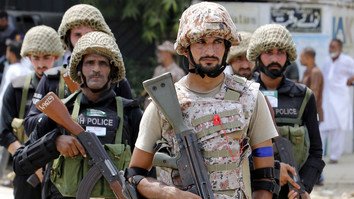PESHAWAR -- Pakistan has seen a decrease in terrorist acts, including those of a sectarian nature, amid ongoing counter-terror efforts, according to a recently published Interior Ministry report and observers.
The overall decrease in terrorism was acknowledged by the "Global Terrorism Index" (GTI), a report published annually by the Sydney-based Institute for Economics and Peace.
"Pakistan also recorded a decrease in the number of people killed by terrorism with a 12 per cent reduction to 956 deaths," the latest GTI report, released November 15, said. "This is the lowest number of deaths since 2006."
"For the third consecutive year Pakistan has witnessed fewer terrorist attacks and deaths," added the report.
Meanwhile, according to a security report compiled by the Islamabad-based Federally Administered Tribal Areas (FATA) Research Centre for the third quarter of 2017, there was a 44% decline in incidents of terrorism.
From April to June, there were 100 violent incidents, the report said, adding that the number fell to to 56 violent incidents from July to September.
"Terrorism has been quelled in Pakistan in general and FATA in particular because of effective measures and sacrifices rendered by our security forces," said Khyber Pakhtunkhwa Governor Zafar Iqbal Jhagra.
About 85% of terrorist networks have been broken and the majority of FATA has been purged of insurgents, Jhagra told journalists November 13 in Peshawar.
The remaining groups that are creating problems are scattered and cannot regroup because of strict security in the region, he said.
At the pace that Pakistani security forces are making gains against terrorism, very soon Pakistan, including FATA, will be cleared of this menace, Jhagra said.
Effective anti-terror actions
About 2,127 terrorists have been killed and 5,884 arrested since the implementation of the National Action Plan (NAP) in January 2015, according to a report that the Interior Ministry issued in November.
Pakistan has 63 proscribed organisations, three of which are under surveillance. According to the data, there are also 8,333 people on the 4th Schedule of the Anti-Terrorism Act (ATA), which requires individuals suspected of terrorism to be placed under police observation.
Authorities restricted the movements of 2,052 individuals and froze 5,023 bank accounts, said the ministry.
The report disclosed that authorities have blocked 937 uniform resource locators (URLs) -- web addresses that can lead to resources other than websites -- and 10 websites of proscribed organisations in Pakistan as part of their effort to dismantle the communication networks of terrorists.
Moreover, the National Counter Terrorism Authority (NACTA) is gaining strength, added the report.
Authorities have executed 483 terrorists under the ATA, since lifting a six-year-long moratorium on the death penalty after terrorists massacred more than 140 children and teachers at Army Public School in Peshawar in December 2014.
Efforts to choke off terror financing are yielding results, the report said.
During the past year, police registered 777 cases of suspected misuse of the hawala/hundi financing systems. As a result, authorities recovered Rs. 1.3 billion [$12.5 million].
In their work to shut down hate speech since the inception of NAP, law enforcement agencies have registered 1,353 cases and made 2,528 arrests.
Aqeel Yousafzai, a Peshawar-based journalist and security analyst, told Pakistan Forward that people still sometimes recall the hard times from 2007 to 2012 when bomb blasts occurred on a daily basis, and how parents started avoiding sending their children to school for the sake of safety.
However, now the situation has improved significantly and people are feeling the positive change in society in terms of security, he observed.
Sectarianism as the enemy
Pakistan has witnessed a marked decline in sectarian terrorist attacks, with only two such incidents reported in 2017, compared to a high of 185 in 2012, according to the Interior Ministry report.
"During the last seven years, a total of 676 incidents of sectarian terrorism were reported, of which 70 were recorded during 2011, 185 in 2012, 127 in 2013, 176 in 2014, 79 in 2015, 37 in 2016 and two such incidents in 2017," APP reported about the Interior Ministry document, giving 2017 figures through August.
"Sectarianism is a branch of terrorism, and for the eradication of the menace [of terrorism], we must annihilate [sectarianism]," Brig. (ret.) Mehmood Shah of Peshawar, former secretary security for FATA, told Pakistan Forward.
Al-Qaeda has funded various sectarian organisations in Pakistan that have the goal of causing chaos and destruction, he said.
"The sectarian organisations that remained active in Pakistan before the announcement of the [NAP] were working as agents of terrorist groups," Shah said.
Examples include attacks in Balochistan Province on the ethnic Hazara population, he said.

![Pakistan Rangers and intelligence personnel August 16 in Lahore present suspected Tehreek-e-Taliban Pakistan (TTP) terrorists to media. They arrested the suspects throughout Punjab. Effective measures by security forces drove down the incidence of terrorism in 2017, according to a report. [Inter-Services Public Relations]](/cnmi_pf/images/2017/11/20/10404-ispr_picture-585_329.jpg)






